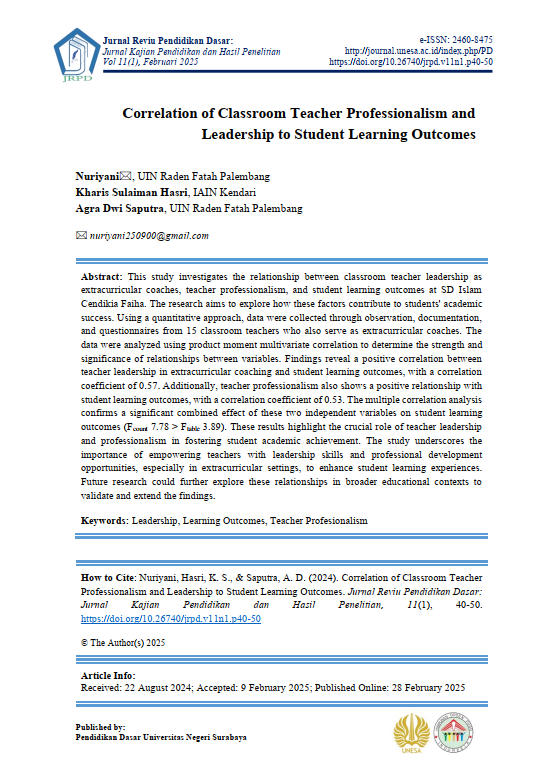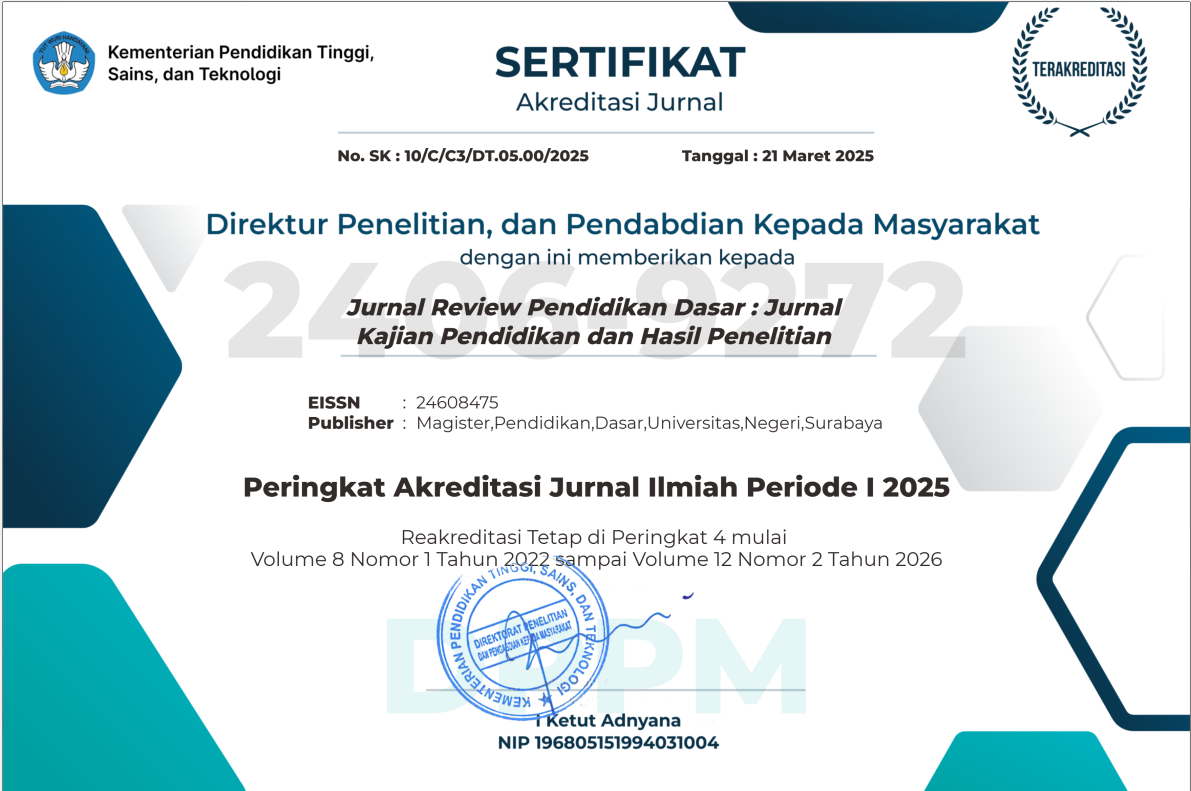Correlation of Classroom Teacher Professionalism and Leadership to Student Learning Outcomes
DOI:
https://doi.org/10.26740/jrpd.v11n1.p40-50Keywords:
Leadership, Learning Outcomes, Teacher ProfesionalismAbstract
This study investigates the relationship between classroom teacher leadership as extracurricular coaches, teacher professionalism, and student learning outcomes at SD Islam Cendikia Faiha. The research aims to explore how these factors contribute to students' academic success. Using a quantitative approach, data were collected through observation, documentation, and questionnaires from 15 classroom teachers who also serve as extracurricular coaches. The data were analyzed using product moment multivariate correlation to determine the strength and significance of relationships between variables. Findings reveal a positive correlation between teacher leadership in extracurricular coaching and student learning outcomes, with a correlation coefficient of 0.57. Additionally, teacher professionalism also shows a positive relationship with student learning outcomes, with a correlation coefficient of 0.53. The multiple correlation analysis confirms a significant combined effect of these two independent variables on student learning outcomes (Fcount 7.78 > Ftable 3.89). These results highlight the crucial role of teacher leadership and professionalism in fostering student academic achievement. The study underscores the importance of empowering teachers with leadership skills and professional development opportunities, especially in extracurricular settings, to enhance student learning experiences. Future research could further explore these relationships in broader educational contexts to validate and extend the findings.
References
Angga, I. M. D., & Wiyasa, I. K. N. (2021). Kontribusi Kepemimpinan Kepala Sekolah dan Iklim Kerja Terhadap Kinerja Guru. Jurnal Pedagogi Dan Pembelajaran, 4(1), 14. https://doi.org/10.23887/jp2.v4i1.32309
Atmojo, H. B. R., Lian, B., & Mulyadi, M. (2021). Peran Kepemimpinan dan Profesional Guru Terhadap Perbaikan Mutu Pembelajaran. Jurnal Educatio FKIP UNMA, 7(3), 744–752. https://doi.org/10.31949/educatio.v7i3.1217
Chaipidech, P., Kajonmanee, T., Chaipah, K., Panjaburee, P., & Srisawasdi, N. (2021). Implementation of an andragogical teacher professional development training program for boosting TPACK in STEM education. Educational Technology & Society, 24(4), 220–239.
Espinosa, V. F., & González, J. L. (2023). The effect of teacher leadership on students’ purposeful learning. Cogent Social Sciences, 9(1). https://doi.org/10.1080/23311886.2023.2197282
Flatt, C., & Jacobs, R. L. (2019). Principle Assumptions of Regression Analysis: Testing, Techniques, and Statistical Reporting of Imperfect Data Sets. Advances in Developing Human Resources, 21(4), 484–502. https://doi.org/10.1177/1523422319869915
Ghamrawi, N., Shal, T., & Ghamrawi, N. A. R. (2024). Cultivating teacher leadership: evidence form a transformative professional development model. School Leadership & Management, 44(4), 413–441. https://doi.org/10.1080/13632434.2024.2328056
Grabowski, D., Chudzicka-Czupała, A., & Stapor, K. (2021). Relationships between work ethic and motivation to work from the point of view of the self-determination theory. PLOS ONE, 16(7), e0253145. https://doi.org/10.1371/journal.pone.0253145
Grimm, F. (2024). Teacher leadership for teaching improvement in professional learning communities. Professional Development in Education, 50(6), 1135–1147. https://doi.org/10.1080/19415257.2023.2264286
Hamid, A. (2020). Profesionalisme guru dalam proses pembelajaran. Aktualita: Jurnal Penelitian Sosial Keagamaan, 10(1), 1–17.
Hennink, M. M., Kaiser, B. N., & Weber, M. B. (2019). What Influences Saturation? Estimating Sample Sizes in Focus Group Research. Qualitative Health Research, 29(10), 1483–1496. https://doi.org/10.1177/1049732318821692
Hermuttaqien, B. P. F., Aras, L., & Lestari, S. I. (2023). Penerapan Model Pembelajaran Problem Based Learning Untuk Meningkatkan Hasil Belajar Siswa. Kognisi : Jurnal Penelitian Pendidikan Sekolah Dasar, 3(1), 16–22. https://doi.org/10.56393/kognisi.v2i4.1354
Hidayat, R. (2022). Pengaruh Kepemimpinan Kepala Sekolah Terhadap Kinerja Guru Dalam Mewujudkan Mutu Pembelajaran. Khazanah Akademia, 4(02), 11–21. https://doi.org/10.52434/jurnalkhazanahakademia.v4i02.74
Hong, Q. N., Pluye, P., Fàbregues, S., Bartlett, G., Boardman, F., Cargo, M., Dagenais, P., Gagnon, M.-P., Griffiths, F., Nicolau, B., O’Cathain, A., Rousseau, M.-C., & Vedel, I. (2019). Improving the content validity of the mixed methods appraisal tool: a modified e-Delphi study. Journal of Clinical Epidemiology, 111, 49-59.e1. https://doi.org/10.1016/j.jclinepi.2019.03.008
Joo, Y. H. (2020). The effects of distributed leadership on teacher professionalism: The case of Korean middle schools. International Journal of Educational Research, 99, 101500. https://doi.org/10.1016/j.ijer.2019.101500
Julismawati, J., & Eliana, N. (2024). Peran Guru dalam Membentuk Karakter Peserta Didik. Jurnal Review Pendidikan Dasar : Jurnal Kajian Pendidikan Dan Hasil Penelitian, 10(3), 255–259. https://doi.org/10.26740/jrpd.v10n3.p255-259
Kraft, M. A., Marinell, W. H., & Shen-Wei Yee, D. (2016). School Organizational Contexts, Teacher Turnover, and Student Achievement. American Educational Research Journal, 53(5), 1411–1449. https://doi.org/10.3102/0002831216667478
Liu, Y., Bellibaş, M. Ş., & Gümüş, S. (2021). The Effect of Instructional Leadership and Distributed Leadership on Teacher Self-efficacy and Job Satisfaction: Mediating Roles of Supportive School Culture and Teacher Collaboration. Educational Management Administration & Leadership, 49(3), 430–453. https://doi.org/10.1177/1741143220910438
Lopes, A., Folque, A., Marta, M., & de Sousa, R. T. (2024). Teacher professionalism towards transformative education: insights from a literature review. Professional Development in Education, 50(5), 832–846. https://doi.org/10.1080/19415257.2023.2235572
Madinah, S., Nursita, L., & Syamsuddin. (2023). Peran Manajemen Kegiatan Ekstrakurikuler dalam Meningkatkan Prestasi Peserta Didik. Al Asma : Journal of Islamic Education, 5(1), 19–28. https://doi.org/10.24252/asma.v5i1.34112
Maghfiroh, M., Asrariyah, M., Fathulloh, Z., Syafa’ah, A., Lailatul Mas’adah, N., & Abdul Halim Sidiq, M. (2021). Tata Kelola Kelas Melalui Kepemimpinan Guru. Idarotuna : Journal of Administrative Science, 1(2), 95–109. https://doi.org/10.54471/idarotuna.v1i2.11
Nafiah, S. (2020). Kompetensi Pedagogik Guru PAI dalam Menerapkan Penilaian Autentik di Sekolah Dasar. AL-WIJDÃN Journal of Islamic Education Studies, 5(1), 57–72. https://doi.org/10.58788/alwijdn.v5i1.402
Podolsky, A., Kini, T., & Darling-Hammond, L. (2019). Does teaching experience increase teacher effectiveness? A review of US research. Journal of Professional Capital and Community, 4(4), 286–308. https://doi.org/10.1108/JPCC-12-2018-0032
Rahayu, A. P., & Dong, Y. (2023). The Relationship of Extracurricular Activities with Students’ Character Education and Influencing Factors: A Systematic Literature Review. AL-ISHLAH: Jurnal Pendidikan, 15(1), 459–474. https://doi.org/10.35445/alishlah.v15i1.2968
Ramamohan, V., & Sarma, K. J. (2016). Holistic Training for Teachers of Higher Education. Journal of Engineering Education Transformations, 0(0). https://doi.org/10.16920/jeet/2016/v0i0/85638
Rudiawan, R., & Asmaroini, A. P. (2022). PERAN GURU PENDIDIKAN PANCASILA DAN KEWARGANEGARAAN DALAM PENGUATAN PROFIL PELAJAR PANCASILA DI SEKOLAH. EDUPEDIA, 6(1), 55–63. https://doi.org/10.24269/ed.v6i1.1332
Seftiani, S., Sesrita, A., & Suherman, I. (2022). PENGARUH PROFESIONALISME GURU TERHADAP MOTIVASI BELAJAR SISWA SD NEGERI. SITTAH: Journal of Primary Education, 1(2), 125–138. https://doi.org/10.30762/sittah.v1i2.2486
Shen, J., Wu, H., Reeves, P., Zheng, Y., Ryan, L., & Anderson, D. (2020). The association between teacher leadership and student achievement: A meta-analysis. Educational Research Review, 31, 100357. https://doi.org/10.1016/j.edurev.2020.100357
Sims, S., & Fletcher-Wood, H. (2021). Identifying the characteristics of effective teacher professional development: a critical review. School Effectiveness and School Improvement, 32(1), 47–63. https://doi.org/10.1080/09243453.2020.1772841
Sintya, A., Fhadillah, I. W., Febriyanti, S. D., Bagariang, D. S., & Sitompul, H. S. (2023). Hubungan Kompetensi Pedagogik Guru Dengan Hasil Belajar IPS Siswa Kelas V SD IT Cendekia Pematangsiantar Tahun Ajaran 2022/2023. Edu Cendikia: Jurnal Ilmiah Kependidikan, 3(02), 229–236. https://doi.org/10.47709/educendikia.v3i02.2534
Tamami, A., & Azkia, L. (2022). PENGARUH KOMPETENSI MANAJERIAL KEPALA SEKOLAH TERHADAP KINERJA GURU DI SMP TAHFIZH AL-BASYIR BOGOR. TADBIRUNA, 1(2), 64–71. https://doi.org/10.51192/tadbiruna.v1i2.273
Ulfadilah, I., Darmiyanti, A., & Munafiah, N. (2023). PENGEMBANGAN KOMPETENSI PROFESIONALISME GURU DALAM PENINGKATAN MUTU PENDIDIKAN DAN PEMBELAJARAN. JEA (Jurnal Edukasi AUD), 8(2), 169. https://doi.org/10.18592/jea.v8i2.7735
Ventista, O. M., & Brown, C. (2023). Teachers’ professional learning and its impact on students’ learning outcomes: Findings from a systematic review. Social Sciences & Humanities Open, 8(1), 100565. https://doi.org/10.1016/j.ssaho.2023.100565
Waruwu, E. W., & Silaen, R. T. (2024). Kualitas Kepemimpinan Guru PAK Menjadi Figur Utama yang Diteladani Peserta Didik. KHARISMATA: Jurnal Teologi Pantekosta, 6(2), 186–201. https://doi.org/10.47167/kharis.v6i2.221

Downloads
Published
How to Cite
Issue
Section
License
Copyright (c) 2025 Jurnal Review Pendidikan Dasar : Jurnal Kajian Pendidikan dan Hasil Penelitian

This work is licensed under a Creative Commons Attribution 4.0 International License.
 Abstract views: 288
,
Abstract views: 288
, PDF Downloads: 180
PDF Downloads: 180



